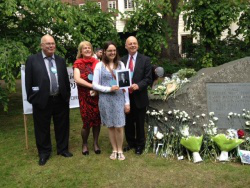Remembering those who said no - Conscientious Objectors of WWI

Family with picture of John Diamond
While events commemorating the centenary of the start of World War 1 are taking place around the UK, a ceremony was held yesterday in central London to commemorate those who refused to take part in the carnage. Being a Conscientious Objector was not an easy option. Several were sentenced to death. Many were imprisoned. Some served on the battlefield as medical orderlies. All faced ostracism and derision.
Every 15 May at 12 noon, supporters of the right not to fight and kill, gather by a commemorative stone in Tavistock Square to celebrate this right, and to recognise the courage of those who held to their convictions.
Yesterday, in a historic gathering, more than 300 people came to hear the families of 65 conscientious objectors of World War 1 give their peace witness of their relatives. After each family said a few words about their grandfather, uncle or cousin, they placed a white carnation - the symbol of conscientious objection – by the granite stone memorial.
Many held up a photo of their relative, mostly young men in their early 20s. A banner behind them showed images of some of the 20,000 conscientious objectors of the First World War.
The prizewinning gospel choir from nearby Maria Fidelis School, Camden, sang two peace songs during the ceremony: ‘The Ones who said No’ by Sue Gilmurray and 'Amazing Grace'.
TV crews, photographers and journalists were there in force, demonstrating the interest in World War 1 commemorations and in the peace witness being celebrated.
Catholic peace organisation Pax Christi was among the peace groups organising the commemoration, and in particular Valerie Flessati and Pat Gaffney.
Long-term Pax Christi volunteer Peggy Atlee was there, aged 96, holding the biography of her father in law, Tom Atlee. He was a brother of Clement Atlee, who did join up and went on to become Britain’s prime minister in 1945. Tom was a committed Christian and believed that war could never be the Christian answer to any dispute, according to his grandchildren – Helen, Cath and Jeremy - and he was prepared to suffer for what he believed in, being imprisoned for more than two years and being unable to work as an architect after the war. Cathy recalls how, going before the appeals tribunal, Tom quoted the Bible on the need to go beyond loving thy neighbour to loving thy enemy. “My grandfather felt he couldn’t go off to fight, for his Christian beliefs would not allow him to fight” Cath said.
Another conscientious objector, Francis Maynell, was a Catholic who went on to become a founder of the 'Guild of the Pope's Peace' to publicise Pope Benedict XV’s appeals to stop the fighting.
One of the speakers, Mary Dobbing, took part last year in the women’s peace delegation which visited the Afghan Peace Volunteers in Kabul. She also campaigns for justice for Palestinians in the footsteps of her grandfather, Herbert Dobbing, a Quaker teacher who spent two and a half years in prison as a conscientious objector during World War 1 and later worked in the Middle East. A Congregationalist in the early days, he became a Quaker after the war. Herbert devoted the rest of his life to building bridges between people through education. “His spirit goes down the generations” she said; “he preferred to go to prison rather than kill people”. Mary believes the actions of the conscientious objectors and the development of that tradition has made peaceful actions more acceptable. At the time of the First World War there was no such tolerance.
Chris Lawson remembered his father Bernard Lawson, who told the 1916 tribunal before which he had to appear to apply for exemption from military service: "I am firmly convinced that war in any form is absolutely contrary to the life and teaching of Christ, that nothing justifies the taking of life and also that it is a great illusion to imagine that a spiritual evil can be overcome by physical force … I acknowledge no one to have power, claim or control over my conscience except Christ." He spent the war in a non-combatant role, caring for wounded and convalescing soldiers in France as they went by trains to the ports on their way back to England.
Women war resisters were not forgotten. Emma Anthony, a member of staff at the Fellowship of Reconciliation, represented her great great grandmother, Lucy Biddle Lewis, who went to The Hague International Women’s Congress in 1915. Also there were the great granddaughters of Alice Wheeldon, a Derby pacifist who provided a safe house for conscientious objectors on the run.
After the event, the families gathered nearby at Friends House, opposite Euston Station, to further share stories and contribute towards archive material being assembled on the conscientious objectors of World War 1.
In total more than eight million combatants from all sides were killed in the First World War and over 37 million were injured. The British Empire lost nearly a million men (more than 35% of the British armed forces) and more than two million British combatants were injured.
For more information see:
Conscience www.conscienceonline.org.uk
Fellowship of Reconciliation www.for.org.uk
Network For Peace www.networkforpeace.org.uk
Pax Christi www.paxchristi.org.uk
Peace Pledge Union http://ppu.org.uk
Quaker Peace and Social Witness www.quaker.org.uk
Right to Refuse to Kill www.rrk.freeuk.com
Women's International League for Peace and Freedom www.ukwilpf.org


















